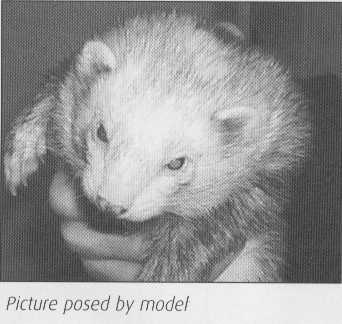On The Couch - You Can't Win Them All
 DR JUNE McNICHOLAS, a senior psychologist and expert on animal behaviour, opens her case notes for Ferrets First readers. In her fifth clinical analysis she examines the case of Lizzie and says: 'Some you win, others...well, you just make the best of what you can do.
DR JUNE McNICHOLAS, a senior psychologist and expert on animal behaviour, opens her case notes for Ferrets First readers. In her fifth clinical analysis she examines the case of Lizzie and says: 'Some you win, others...well, you just make the best of what you can do.
It's easy to look through case notes and only pick out the success stories but sadly life isn't all successes. Life is cruel and sometimes the cruelty and neglect inflicted on ferrets means that no matter what you do, it's too much for a ferret to learn to regain complete trust in people. In such cases you can only hope for partial success.
Regular readers of Ferrets First may remember the story of Laurie, the ferret who had lived so long alone he couldn't relate to other ferrets until he was introduced to a group of ferrets who had lived, in their own way, a similar isolated existence. This is the story of that group and, in particular, one young jill called Lizzie.
The story starts with two young jills who had been acquired by someone who had problems of their own coping with life's demands. We can only reconstruct their story from subsequent events as found by the RSPCA and Social Services but it probably went something like this. Neither of the young jills were well handled and this was probably made worse for their new owner by the fact they were both pregnant when she got them. Their unpredictable behaviour panicked the owner into leaving them loose in a back room of her flat with only and old sofa in it. A neighbour threw in a tin of dog food each day. The owner's problems meant she spent less time in the flat and she eventuatlly disappeared altogether.
Both jills gave birth, no one will ever know to how many kits, but they somehow managed on their meagre diet to rear seven between them. These kits were at least eight weeks old before they even saw a human. The mums and kits lived in the back room in the sofa while their droppings over the weeks turned the carpet into a heaving mass of maggots.
Eventually, Social Services were contacted and they called in the RSPCA. The RSPCA contacted Jeff and myself, although we were outside 'their' county boundaries. The poor collection officer was literally heaving with nausea when she collected the ferrets.
It was, without a doubt, the most pathetic bundle of ferrets I've ever seen. The kits were so terrified and malnourished it was impossible to tell whether their crawling gait was due to fear or rickets. Yet, despite their own fear and poor health, the two mothers were courageously protective of their kits, hissing, spitting and daring us to venture too close.
The group were hard work and recovery was slow. However, over the weeks, good food and gentle quiet surroundings restored good health and the kits became normal happy young animals. One mother, a little polecat jill we called Harriet, also relaxed and became a very affectionate playful character. Indeed, along with Laurie and two of her huge hob kits, she went on to do sterling PR work.
But then there was Lizzie.
Lizzie was the other mum, a strikingly beautiful silver mitt, once she regained health and condition. But her temperament was far less easily repaired then her physical health. Unlike Harriet, Lizzie retained her hatred and distrust of people. She hated me and would bite very hard at the slightest opportunity. Yet her behaviour towards me was mild in comparision to her behaviour towards Jeff. She made it a point of conducting a 'seek out and destroy' mission where he was concerned. It got to the stage where he couldn't even be in the same room as she was, she became so agitated and so determined to inflict damage on him.
No matter how well we treated her, how much much we tried to fuss her, pet her and give her treats, she hated us. She hated us near her, she hated us near her kits. IT was a dismal time for all of us. We felt we were failing her, she must have felt we were tormenting her trying to make friends. As far as she was concerned, the only good human was one in howling retreat, and the more blood the better.

So what could we do? Many people said she was a psychopath and it would be kinder to have her put to sleep. We had to consider the possibility, it seemed so hopeless a case. I'm not sure whether it was wishful thinking, pig-headedness or cowardice that made us resist the decision, but we opted for giving her time.
It wasn't a solution, not in the sense of finding a way of resolving what was essentially a stalemate, but indirectly, it gave an alternative. We stopped our attempts to make Lizzie into what we wanted her to be, instead we took to looking for her positive points and at what she was making of her life. She was devoted to her kits and this was making her very protective and defensive. 'Let them grow up', we thought. 'Maybe when they don't need her so much, she'll relax a bit more'.
The weeks ticked by and the kits grew up. Lizzie still hated us, but we watched her life as she made it. She played with the kits - almost like a kit herself. She found pleasure in every toy we put in the pen and she chuckled in delight with each new experience and game with her group.
She just hated people.
More weeks ticked by. She still hated us. We had decided to ignore Lizzie's behaviour in favour of what we could do for the others in the family. They grew up strong and healthy with endearing, if sometimes wickedly mischievous, characters. Lizzie was always on the sidelines, never to be trusted. Yet, left to her own devices, she did calm down a little. She ceased trying to maim Jeff and she even allowed me to handle her without biting - well, at least not drawing so much blood, anyway! It could have been the turning point.
It could have been, but it wasn't. Such stuff can happen but it is often confined to fairy tales. Lizzie's is not a 'happy ever after' story in the traditional sense. It's more of an agreement, an acceptance. 'What can't be cured must be endured' as my gran would have said.
Today, Lizzie lives a very happy life. She is touchingly devoted to her ferret family, has unbounded joy in toys and games and revels in every new experience. To all intents an purposes she is a happy, chuckling, giggling young jill. Yet she will never accept people. There is a mutually respectful understanding between Lizzie and myself and Jeff. She will permit herself to be handled to a minor degree. We accept she may bite, she understands we know this. We don't give up trying to improve her temperament, but we take out lead from her. She genuinely doesn't want people as a major part of her life, so we respect this.
Essentially what we have done is to redifine 'problem behaviour'. Lizzie didn't think her behaviour was a problem, we did. What we had to do was to judge whether her behaviour needed correction and what the costs and gains would be in achieving it. She's hundreds of per cent better than she was originally but by no means a reformed character. There may be more improvement, but in the meantime we have accepted Lizzie on her terms. Her behaviour is no longer a problem to us, we understand the limits she has drawn up. What is important is that she has a good quality of life and I genuinely believe we have achieved this for her.
Sometimes life's scars can mean animals - and humans - become irreparably damaged. In such cases we have to accept some form of compromise, that we can't totally undo what has been done. If we had insisted that Lizzie be what we thought she should be, we would have failed and she would probably have had to be put down. Instead we adjusted and found ways to cope with her problems.
Today. Lizzie is a happy creature in her own way, although not what we might have wished from her. But that's our fault, not hers. We had the false visions, not her. She's beautiful enough to be a show stopper, she might have been an exceptional worker, and what an eye catching PR ferret she could have made. Instead she has made her own life and we are happy for her.
After her experiences with people we feel she owes us nothing. And at this time of year, it can do no harm to remember that tolerance and acceptance are essential parts of love and understanding.
